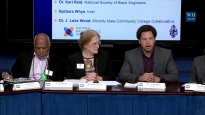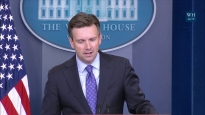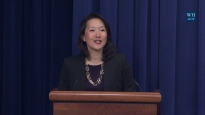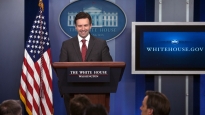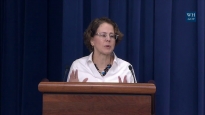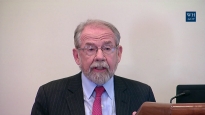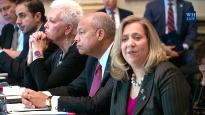Press Briefing
January 30, 2012 | 40:49 | Public Domain
White House Press Briefings are conducted most weekdays from the James S. Brady Press Briefing Room in the West Wing.
Press Briefing by Press Secretary Jay Carney, 1/30/12
James S. Brady Press Briefing Room
12:44 P.M. EST
MR. CARNEY: Good afternoon, ladies and gentlemen. Thank you for being here. Hope you're enjoying the spectacular weather. It's supposed to get even warmer this week.
Before I take questions I wanted to remind you that later today the President will participate in an interview with YouTube and Google+ to discuss his State of the Union address. The interview will be held through a Google+ hangout, making it the first completely virtual interview from the White House. The President will answer questions submitted by and voted on by citizens from across the country.
Through the White House YouTube channel, nearly 228,000 people submitted more than 133,000 questions and cast over 1.6 million votes leading up to this interview with the President. President Obama will answer a selection of the top-voted questions submitted through YouTube and engage with Americans in locations across the country, virtually, in the Google+ hangout.
Continuing the administration's commitment to public engagement and participation, the White House launched an official presence on Google+ this month -- earlier this month. The White House Google+ page delivers news, engagement opportunities and behind-the-scenes content to its followers. President Obama's interview kicks off a series of White House hangouts in which members of the Obama administration will continue to use this platform to engage with citizens on a range of issues. Video of the Google+ hangout will be streamed on WhiteHouse.gov and to the Briefing Room at 5:30 p.m.
Q Just a quick follow on that?
MR. CARNEY: Sure.
Q Can you explain exactly what Google+ is? (Laughter.)
MR. CARNEY: Google+ is Google's social media vehicle. But for more questions I refer you to the good folks at Google. But you're right to ask.
The Associated Press.
Q Thanks, Jay. There are some reports out of Cairo that the U.S. embassy there is giving shelter to Americans to prevent them from arrest. Is the White House taking any steps to secure and protect their freedom?
MR. CARNEY: Well, I can confirm that there are a handful of American citizens at the embassy. We're not aware that they're in any danger, but that handful of citizens has opted to stay in the embassy compound in Cairo while waiting for permission to depart Egypt. As you know, these are citizens who have been told they cannot leave Egypt.
We have, in our discussions with the staff of the Supreme Council of the Armed Forces, we've made clear our concerns about this issue and our disappointment that these several citizens are not being allowed to depart Egypt, in connection with the government's investigation into NGOs. And we continue to work with the Egyptian authorities to resolve this issue as soon as possible.
Q You said a "handful," and also "several." Do you know how many we're talking?
MR. CARNEY: I don't have anything more specific for you than that. I don't have a precise number to give you or any individual names.
Q To my question you said they're not in danger. But they are in danger of arrest, are they not?
MR. CARNEY: Well, what they are in -- what the issue is, as I understand it, is that the Egyptian authorities have said they cannot leave the country. I don't know that there is an issue of arrest, although I would refer you to the State Department for that.
Q Is the President, more broadly, growing frustrated with the pace of change in Egypt, particularly in the military council's hold on power there?
MR. CARNEY: Well, I think it is important to step back and noted -- and note, rather, that Egypt has achieved several historic milestones in its transition to democracy in recent days, including the first seating of democratically elected representatives of the People's Assembly since the revolution, the transfer of legislative authority to those representatives by the Supreme Council of the Armed Forces, and the SCAF's announcement that it was taking steps to lift the state of emergency that has existed in Egypt for several decades. There was also the peaceful commemoration of the revolution that made these steps possible.
So we congratulate the Egyptians on these important steps toward fulfilling the promise of Egypt's revolution, which, as we all remember, inspired the world. There are challenges that remain, but it's important to remember that Egypt has come a very long way. As regards the issue that you talked -- that you started this round of questions with, we are concerned about it and we are in discussions with Egyptian authorities about it.
Q One other topic, on a domestic matter. I know sometimes you comment about the happenings on the Republican campaign trail, sometimes not. This was one comment over the weekend -- I was wondering if you had a reaction to the chairman of the RNC comparing President Obama to the Italian ship captain who abandoned his passengers in that tragedy?
MR. CARNEY: Well, because that was obviously -- well, let me just say that if you are so desperate for attention that you make an analogy that Michael Steele deems inappropriate, you know you've probably gone too far.
Yes.
Q Russia's foreign ministry says Syrian President Assad's government has expressed a willingness to participate in Moscow-mediated talks to resolve Syria's crisis. What's the U.S. position on these talks? Would they have any -- would there be any concern that this would just further delay the process of Assad’s exit?
MR. CARNEY: Well, we don’t have details at this point on that meeting but, in general, we support efforts to reach a political solution that stops the violence in Syria.
We are intensely discussing with the Russians the real deterioration on the ground in Syria and the very disturbing rise in violence there. We’re discussing with the Russians and other partners how best to use all the levers at the command of the international community and the United Nations to press the Syrian government to stop its appalling and ultimately ineffective and harmful repression.
So we’re working with all our partners, and we believe that the Security Council -- that it’s important that the Security Council take action.
Q Does the U.S. fully back the Arab League’s initiative that’s been brought to the Security Council?
MR. CARNEY: We believe that the Security Council should not permit the Assad regime to assault the Syrian people while it rejects the Arab League’s proposal for a political solution. We do support the Arab League’s role in this process. And governments that act to prop up Assad’s brutal regime will find themselves in a small minority and criticized for abetting further human rights violations.
I mean, it’s important to look at where this process is headed. Assad’s fall is inevitable. And so as governments make decisions about where they stand on this issue and what further steps need to be taken with regards to the brutality of the Assad regime, it’s important to calculate into your considerations the fact that he will go. The regime has lost control of the country and will eventually fall.
Q And if Assad’s fall is inevitable, as you say, is the U.S. involved in or aware of any international efforts to arrange his going into exile?
MR. CARNEY: No, I don’t have any information on that -- none that I’m aware of. I mean, we support the Syrian people in their transition to democracy. We’re working with our international partners to continue to pressure the Assad regime to get it to stop its brutal and appalling behavior, and to step aside so that that transition to democracy and a peaceful transition can take place.
Q The President this weekend in his weekly address talked about the nominations process and said that a senator was going to hold all nominations unless he fired Richard Cordray. Is this just a complete breakdown of the system? And does that mean more recess appointments?
MR. CARNEY: Well, let’s examine the first part of your question. It is an example of how the system has broken down. That out of pique, a single senator can hold up all nominations is highly unfortunate. And that's why the President mentioned it in his weekly address. It is not how the system should work.
Moreover, to hold up the process and claim that no nominations will be cleared until the President removes the consumer watchdog that is so vital to the implementation of the Wall Street reforms that were put into place to prevent the kind of disastrous financial crisis that caused the greatest recession since the Great Depression is shocking in and of itself. It’s certainly not a position that would be broadly supported by the American people; may not even be a position broadly supported by the constituents of the senator in question.
It’s just the wrong approach, and it’s not something that is conducive to getting the work that the American people want done, done here in Washington.
Bill.
Q There’s a report today that Freddie Mac has securitized large sections of its mortgage holdings to earn interest, at the expense of homeowners who could refinance because if they did so, Freddie Mac would lose money on their investment portfolio. Does this constitute a conflict of interest?
MR. CARNEY: Well, we saw those reports and they certainly raise some concerns. As you know, this is an independent institution with independent governance, so we don't make those kinds of decisions. But I believe Treasury is looking into it.
Q It would seem that it flies in the face of the President’s request to make homeowner refinancing more easy and more affordable.
MR. CARNEY: Well, I'm not an expert in this, but I don't know that it flies in the face of that at all. I think it is a judgment worth looking at -- again, by an independent agency. The President's commitment to making refinancing more available is absolutely firm and is not changed by anything that this independent agency is doing with regard to that. And you'll hear more details about that from the President later this week about the refinancing initiative.
Dan.
Q Thanks. How much of a drag will the continued debt problems in Greece have on the U.S. economic recovery?
MR. CARNEY: We have said, and it continues to be the case, that Europe remains a concern. The Europeans have taken important steps towards dealing with their financial issues -- financial and markets issues. There have been positive developments, but more work needs to be done. And this is a European issue and the Europeans have the capacity and the wherewithal to resolve it.
We have been very engaged, both at the level of the President and, in particular, at the level of the Secretary of the Treasury, in an advisory capacity because we have some experience dealing with this kind of financial crisis and mitigating and resolving it.
So the fact that in a global economy a problem in Europe could affect our economy only reminds us and reinforces the fact that we need to take every measure we can on the issues that we control, to ensure that our economy keeps growing and it keeps creating jobs.
That's why the President put forward the American Jobs Act in the fall. That's why he looks forward to the Congress extending without drama or delay the payroll tax cut to 160 million Americans, as well as unemployment insurance. And it's why he will continue to press on the initiatives contained within his State of the Union address that are aimed at economic growth in the manufacturing sector and in innovation.
Because there -- because it is a world filled with potential problems to our global economy that may or may not transpire, you need to, here in Washington, do everything you can -- as an elected member of Congress and as President of the United States -- to create some insurance for our economy, that it continue to grow and create jobs. And that's what this President is committed to doing.
Q So when you say that the President has been involved in an advisory role, has he been making phone calls? I mean, what specifically has he been doing?
MR. CARNEY: I don't have any recent phone calls to read out to you, but as you know, for the past many months the President has been engaging with his European counterparts on this issue via telephone, as well as in meetings at the G20, for example. And Secretary Geithner has as well, with his counterparts, and he's traveled to Europe as well.
So while it is a European issue that requires a European solution, we have important experience that we can bring to bear in advising -- offering our advice and counsel to the Europeans in how they deal with this. And we urge the Europeans to continue to take the important measures necessary to stabilize the situation, to build the firewall necessary to ensure that this is resolved.
Q During the State of the Union, the President said -- talking about the importance of keeping young people in school -- said, "So tonight I am proposing that every state -- every state -- requires that all students stay in high school until they graduate or turn 18." Can you flesh that out a little bit more? What specifically is the President going to do to push this proposal, I guess, forward?
MR. CARNEY: Well, I don’t have any more details for you on the proposal. The principle itself I think the President believes is very important, that in today's economy, it is vitally important that states take action to ensure that Americans stay in school, that they get the education they need -- the minimum education they need to be competitive in the workplace.
So the President's commitment to education as a cornerstone to our economic growth I think has been clear now for three years, and his approach has been to reform in a way that has enjoyed bipartisan support. It’s an area where there has been a significant amount of bipartisan support, and he continues -- he looks forward to continuing to work with members of Congress and other stakeholders around the country to push education reform forward.
Because it really is -- it really is about our economic future. We need to make sure that we have the most skilled workforce, the most educated workforce because that's our competitive advantage with other countries around the world.
Jake.
Q A couple questions. First of all, are we going to get any details -- is the public going to get any details about the so-called Buffett Rule before the budget? Or is it going to be in the budget?
MR. CARNEY: I don't -- I wouldn’t anticipate more details from us prior to the budget. The Buffett Rule, as you know, as the President described it in the State of the Union, and certainly as Mr. Buffett has described it, is a principle that will guide the President’s approach to tax reform, and that principle is simply that it’s not -- in an environment like the one we live in, where we have important investments that we need to pay for, whether it’s national security or investments in education and innovation, everyone needs to pay their fair share.
And it is not -- it’s not fair to have a tax code that because of loopholes and other things within it where you have a millionaire or a billionaire paying a lower effective tax rate than some sizeable number of middle-class Americans.
Q Are we going to get details?
MR. CARNEY: Well, I think you will get more details, but not prior to the budget. I don’t anticipate --
Q The budget will be scored by CBO?
MR. CARNEY: I don’t have any more details on that for you.
Q Vice President Biden over the weekend attended a retreat in which -- a Democratic House retreat in which he shared some details, in his inimitable style, about the decision-making process in the OBL raid, in which he said that he actually recommended against it, and everybody else in the room, with the exception of Secretary Panetta, hedged their bets. Is that accurate?
MR. CARNEY: Well, Vice President Biden was one of the handful of people involved in this process, and I certainly -- I know that he’s speaking accurately. I think the broader point, as the President has made here, is that this was not a sure thing, but the President had so much faith in our special forces and their capacity to fulfill this mission, that he made the call to go forward. I think Secretary Gates has spoken about this as well.
And that’s why it’s a presidential-level decision, because in the end, as with a lot of decisions, your advisors come together and have compelling arguments on either side, and you have to make the call. And that’s what the President did in this case.
Q Thank you.
MR. CARNEY: Roger and then Wendell.
Q Thank you. Along the lines of budgets, Mr. Furman, last week in a conference call, mentioned corporate tax reform. Will that be part of the budget, too?
MR. CARNEY: I think you will see more details about corporate tax reform around the period of the release of the budget, yes.
Q And when you say “around the period,” meaning budget date, February 13?
MR. CARNEY: I think I mean around that date. I don’t want to pin it to a specific date.
Q Okay, another subject. Three Republicans in the Senate are introducing legislation to give Congress the authority to approve Keystone. Will the White House -- will the administration weigh in, in opposition to that?
MR. CARNEY: I don’t have an opinion on a possible piece of legislation that may or may not come to pass. I think we need to remember when -- it’s important for you to remember and everyone to remember in looking at this issue how we got here. A process was in place, consistent with precedent, where the State Department was reviewing the request for a permit here. When significant concerns were raised about the pipeline route, not least by the Republican governor of Nebraska, a decision was made to seek an alternate route -- one that did not run through territory over the aquifer there in Nebraska.
The State Department made that decision; the President concurred on that decision. It required an expansion of the time period to review the request, as would be appropriate because it was an alternate route -- an alternate route that, as far as I know, still has yet to be identified.
Republicans, with absolutely clear warning from the State Department that doing so would put them in an untenable position, chose instead for political partisan reasons to insert this extraneous measure in the payroll tax cut extension, thereby all but ensuring that the State Department would recommend denying the permit because it could not grant a permit on a pipeline route that hadn’t even been identified.
So that's why we are where we are. And whatever actions are taken in the Congress with regards to this, it’s important to have that as a backdrop when you’re writing about it or discussing it.
Q Well, I realize it’s only a bill introduction and, as you say correctly, it’s got a long way to go. But I’m just wondering if the White House would try to head it off, with a sense that momentum --
MR. CARNEY: Let’s see what happens. I don't have anything to predict.
Q And one other thing, on the meeting with Saakashvili this afternoon. Will the President be asking Georgia to contribute more troops in Afghanistan? And also, what does the meeting -- what kind of impact may it have on U.S.-Russia relations?
MR. CARNEY: Well, let me just say that the President looks forward to the meeting with Georgian President Saakashvili today in the Oval Office. This year marks the 20th anniversary of diplomatic relations between the United States and the Republic of Georgia.
Today the two Presidents will discuss further strengthening the U.S.-Georgia Charter on Strategic Partnership by enhancing our cooperation in the fields of trade, tourism, energy, science, education, culture, and security.
President Obama will underscore the importance of our defense cooperation with Georgia, including Georgia's substantial contributions to international security operations in Afghanistan. The President will reconfirm U.S. support for the integrity of Georgia's territory within its internationally recognized borders. The President also looks forward to discussing upcoming elections in Georgia and the reforms that will ensure Georgia's continuing transformation into a vibrant and stable democratic state.
How's that for an answer?
Q Well, I get all that --
MR. CARNEY: Well, I'm not going to -- (laughter) -- well, let's wait for the meeting to happen, and if we have a readout to provide, we will provide it to you. I think that our approach to Georgia and Georgia's relations with Russia has not changed. And this meeting is -- the President looks forward to it, for all the reasons I just described.
Wendell.
Q A couple of questions. Recognizing that the upcoming budget will have elements of restraining spending and also try to preserve the economic recovery, which direction will it tilt toward? More spending to make sure the recovery doesn’t go south, or really getting a handle on the debt?
MR. CARNEY: Well, Wendell, as you know because you reported on it, the spending has already been decided through the Budget Control Act. The overall amount that will be put forward in the budget was decided in August in a bipartisan vote.
And it's important, since you asked, to remind everyone that when it comes to deficit reduction and dealing with our long-term debt, this President, working with Republicans as well as Democrats in Congress, has already locked in over $2 trillion in deficit reduction through spending cuts.
More needs to be done, and you can be sure that the proposal the President put forward last fall for a comprehensive balance to deficit and reduction will be reflected in his budget, because it's the right way to go, as every independent bipartisan commission has said and which this President firmly believes. And that balanced approach has to include revenues as well as entitlement reforms. The President has been committed to that approach from the beginning and he remains committed to it, and you'll see that reflected in the budget. Spending was decided with Republicans late last summer.
Q And on Iran, Secretary Panetta says that it's possible they could have a nuclear weapon within a year should they decide to try and do that. Senator Lieberman says at some point the U.S. is going to have to decide whether to act militarily to prevent that. Does that mean that since the President has already said all options are on the table, he's going to have to make that decision within a year whether or not to use military force to deal with Iran's nuclear program?
MR. CARNEY: The President has made clear two things: one, that he is determined to prevent Iran from acquiring nuclear weapons. That is our policy. He has also said that he takes no options off the table. The strategy that he has been pursuing, with broad international support, has resulted in the most onerous sanctions ever placed on Iran that have had clear effect on the Iranian economy and on the Iranian regime, that have isolated Iran more than it has ever been. And we will continue the pressure, using all the means at our disposal, working with the international community, to pressure Iran into living up to its international obligations.
Q Well, does the President agree with that timetable, though, that he's going to have to make a decision in a year?
MR. CARNEY: Well, that's Wendell's words about when he has to make a decision. I think the Secretary also went on to talk about delivery vehicles and the timeline for that. But I don't want to get into --
Q He did suggest that it would take longer --
MR. CARNEY: -- analyzing timetables. But what I can tell you is that this President's policy is clear. He has stated repeatedly that he and this administration are determined to prevent Iran from acquiring nuclear weapons. We have a comprehensive strategy that we've been executing with the international community and partners and allies around the world that is having a clear impact on the Iranian economy, and we continue to make clear to the Iranians that the way to relieve the pressure is to -- through the P5-plus-1 process, live up to its obligations. That is the right approach. It is also the right approach to leave no -- take no option off the table.
Q No one denies the impact the sanctions are having, but they also don't appear to be dissuading Iran from moving forward with its nuclear program. So doesn’t Secretary Panetta's assertion that they could do it within a year put a timetable on the President for making a decision?
MR. CARNEY: It's an estimate based on the administration's view about the development of the process in Iran. But it doesn’t change our strategy, which is continue to put pressure, continue to isolate, continue to make clear to Iran what its options are and how outside the international community their behavior has placed them, and also make clear that we're not removing any options off the table -- from the table -- and then move forward.
MR. CARNEY: But, Jay, are there signs that, other than having a clear impact on the Iranian economy, the strategy is having an effect on their decision to go forward --
MR. CARNEY: Mara, I appreciate the question, but what signs would you look for economic sanctions to have except for on the economy? So that's -- they are having the desired effect. Ultimately, the diplomatic/sanctions approach we hope will have the effect of changing Iranian behavior.
It is certainly important to push that process forward, working with our international partners, and it is simply a fact that we have a situation where the world is united against Iran on this issue, and Iran internally is divided, which is the reversal of the world as it was when President Obama took office, where the world -- or much of it was blaming the United States in its approach to this for what was clearly Iran’s problem. And through the policies of this President, and the approach that this President has taken, the world now sees Iranian behavior for what it is, and that has resulted in the kind of sanctions regime that we’ve been able to put together.
Kristen.
Q Jay, thanks. The Washington Post reported on Friday that the DOD is taking what was supposed to be a decommissioned warship and turning it into a large floating base, reportedly headed to the Middle East somewhere. Can you say specifically where it’s headed?
MR. CARNEY: I would refer you to the Department of Defense.
Q Is there any concern that this might be perceived as antagonistic towards Iran?
MR. CARNEY: Well, again, I would refer to the Department of Defense. As is the case with the Gulf and the Strait of Hormuz, our presence there is part of a rotation that has not changed at all and ensures that we maintain a significant presence in the Gulf.
Regarding the specific issue that you just mentioned, I would refer you to the Pentagon.
Q And also, Jay, Occupy Wall Street protesters are making headlines again. As you know over the weekend, 400 protesters were arrested in Oakland, and now today the National Park Service is expected to clear out protesters, potentially as we speak, from a site here in D.C. What is your reaction? And is the administration concerned that some of these protesters are taking things too far?
MR. CARNEY: Well, with regards to Oakland, that’s obviously a local law enforcement matter. Here in Washington, I would refer you for specifics to the U.S. National Park Service and the U.S. Park Police. And our position has been and continues to be that we need to balance First Amendment concerns of the right to demonstrate, the right to speak freely, with public safety concerns and public health concerns. And we understand that whether -- that local law enforcement, as well as, in this case, the National Park Service and U.S. Park Police, are weighing those considerations when they make these decisions, and that’s appropriate.
Q Since Mr. Grossman, Mark Grossman, was unable to get into Pakistan, has the President had any discussions with him specifically about that matter and about the state of our relations with Pakistan? Plus, I have a related question, which I’ll give you now, which is --
MR. CARNEY: I’m not aware of any conversations the President has had with Mr. Grossman. Broadly, I could give you our view of U.S.-Pakistani relations and the fact that that relationship has been and continues to be complicated but is very important to our national security interest, to our fight against al Qaeda, and to the stability of the region.
So that’s our broad view. I don’t have anything specific on the President and Ambassador Grossman.
Q Can I ask you also -- it’s been some time since we got any kind of announcements about the AfPak meetings. Why has that fallen off? And can you talk about how many meetings he’s had since the last time we heard about those meetings?
MR. CARNEY: Well, I don’t have -- I’ll have to take the question. It’s obviously a high priority, a national security priority for the President. We’re very transparent about the implementation process of the President’s strategy and we’ll continue to be. We are in now a phase of drawing down the surge forces as we begin the transition to Afghan security lead that will reach a culmination in 2014.
In terms of meetings of the AfPak group, I’ll have to take the question. It’s certainly an issue that is discussed frequently in the President’s national security time with his National Security Council advisors.
Q Can I just follow? Coming back to Syria for a moment, the Turks tried a few months ago to have talks with Assad and try to come to a settlement. And at that time, the President waited for a few days but then told Prime Minister Erdogan, you know, this is not working, we have to move on. And so I wonder why in light of that precedent, you even said that -- you sounded somewhat open to the Russian effort. Why would the Russians --
MR. CARNEY: We support efforts to bring about a solution that results in the Assad regime leaving, to the peaceful transition to democracy that the Syrian people demand and deserve, and we welcome efforts toward those ends by the Arab League, by the Russians, by the Turkish government. I mean, this is -- because we share the goal here.
Q But that’s not going to stop you from pushing for a resolution.
MR. CARNEY: That’s correct. That’s correct. It will not stop us.
Q And you're sending Hillary Clinton up to New York just to --
MR. CARNEY: We are. She's going up the United Nations Security Council. I believe she's put out a statement just within the last hour or so on this issue and making our position very clear. The Security Council should not permit the Assad regime to assault the Syrian people while it rejects the Arab League's proposal for a political solution. As I said before, governments that act to prop up Assad's brutal regime will find themselves in a small minority, and criticized for abetting further human rights violations.
Because Assad's fall is inevitable. And as we -- as countries make this determination about where they -- the approach they want to take to this issue, they should understand that the genie is out of the bottle -- Assad's regime will fall. It will not -- the status quo ante will not pertain again. And everybody needs to work towards a peaceful transition in Syria.
Q The last time around, the administration was willing to give the Turks a little bit of time to see whether they could make something happen. It sounds like this time you're saying to the Russians, okay, that’s fine, we support you, but we're going to go full-steam ahead at the U.N.
MR. CARNEY: Well, I don’t think it's an either/or; I think it's a both/and. And obviously these processes don’t all happen when you just snap your fingers. This is part of working with the international community, working with our partners and allies.
But as we saw just over the weekend, the level of carnage in Syria seems to be increasing; the appalling brutality is not abating at all. And it's important that the international community come together to make clear to the regime that this is unacceptable and it has to stop.
Q Jay, many people have heard the rumors about the First Lady's purchases in New York. I know it's British tabloids, but can you help us squash this rumor? In light of other --
MR. CARNEY: Neal, I'm shocked that you're the one to ask this question. But let me just answer and say that, at least when I was a reporter, usually the standard for British tabloid reporting was the assumption that it was false. In this case, it's utterly false, and it's irresponsible of an American news organization to repeat the story, even allowing that it could be true. So it's wrong.
Q Can you provide some evidence that it's wrong? Because I'd hate to print some incorrect information.
MR. CARNEY: I'm sorry, can you provide -- I'm not going to go there, Neal. It's false.
Mark.
Q Jay, can you tell us the President's thinking in deciding to go to the Alfalfa Club dinner on Saturday night?
MR. CARNEY: Well, the President has attended this particular dinner before. It is certainly a tradition here in our great nation's capital for sitting Presidents to attend these functions on occasion. I think they would all wish that it were annual. In this case -- in this President's case, it has not been with either this dinner or the Grid Iron. He enjoyed himself. He hopes that his speech entertained. I certainly thought it was funny.
Q Now, we didn’t get to see all of the speech. You put out excerpts, you didn’t put out a transcript. Why is that?
MR. CARNEY: Well, I believe the Alfalfa Club has a long tradition of -- I think we're pushing the envelope here in terms of its traditions and our release of excerpts.
Carol, you're awfully quiet over there. Do you have anything?
Q Well, on the Google thing tonight, are you guys monitoring those questions, or is Google doing -- who's going to choose --
MR. CARNEY: I believe it's Google+ that --
Q So the White House isn't doing any screening of the questions?
MR. CARNEY: Well, we don’t -- I know we're not picking the questions. Would that we could.
Connie.
Q Thank you. Has the President ever said anything about this long, extensive series of primaries and debates? Does he believe, especially in this time of economic hardship, that these are really a good thing for the country?
MR. CARNEY: The President believes that the primary process is the way that we in this country choose our nominees for the major political parties. He obviously participated in a very long process four years ago, and he looks forward to the time when there is a nominee from the other party and for that debate to be joined. But the process has a long tradition behind it.
Chris.
Q Yes, thanks, Jay. There was a report a week ago that the Labor Department and other agencies had already given their thumbs-up to an executive order that would bar -- that would expand the existing executive order barring discrimination in federal contracting based on sexual orientation and gender identity, and that the issue is at the White House for review. Can you confirm that report? And do you know if and when the White House is going to approve that order?
MR. CARNEY: I can't confirm it. I will take the question and look into it.
Thanks very much.
END
1:25 P.M. EST
|
October 28, 2016
|
October 27, 2016
|
October 27, 2016
|
October 26, 2016
|
|
October 26, 2016
|
October 25, 2016
|
October 24, 2016
|
October 24, 2016
|
- &lsaquo previous
- …
- 11
- 12
- 13
- 14
- 15
- 16
- 17
- 18
- 19
- …
- next &rsaquo
